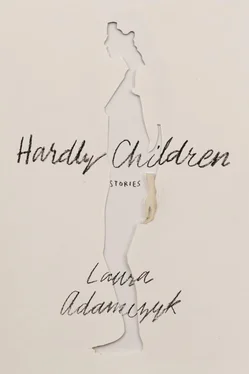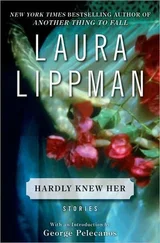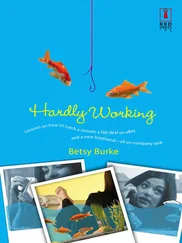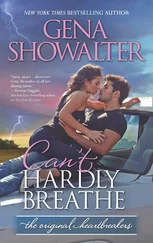The air was humid and close from the rain, my skin slick with it. In my book, the protagonist’s sister had just gotten her face eaten off by the scaled beast—a low blow, as the protagonist had really seemed to like her sister. Before the train ran express to the nether regions of the city, one last man ducked into our car. He was a tree-sturdy man in a denim shirt and brown boots. Someone in the habit of walking slowly. It used to be that I’d stare and stare at strangers then look away. But when the man at the door finally saw me, I kept at him. I shaped my mouth into something like a smile. He returned the look for only a moment then lowered his head to his newspaper.
At the first stop out of downtown the doors opened and released a sigh of people. The next stop, the same, only less so, the crowd loosening. I got up and stood next to the man by the door. He was somewhere in the soggy middle of the paper, where tucked down in the corner was a black-and-white headshot of a woman in a blazer. The text above her head read, What of the Children?
Scary stuff, I said.
What’s that?
The weather, I replied. Wind gusts up to seventy-five miles per hour.
I put my hand to my chest and tickled my shirt, a gesture I thought hinted at sensitive concern, one I’d been practicing for some time and that did not go unnoticed by my new, tall friend. His eyes traced a line from my chest to my face. Tilting his head, he said, That’s windy, and I knew I wouldn’t have to ask him to walk me home.
* * *
IN THE MORNING PAPERS:five more children taken. Five more children who had been out the day before—loitering, skateboarding, double-dutching. One child, who was hardly a child anymore, had been out for a walk with his friend, taking in the last day of summer warmth, and a man had not liked the way this hardly child had been walking. The man had used the word “strutting”— Strutting around in his tennis shoes and T-shirt —and he told the child, hardly a child, Son, we need to have a talk . A hand on his shoulder then several men and several hands on his shoulders and into a white van that had either snuck up just then or been there all along. In the middle of the day , the paper said, because this was the important part of the story, the part that was new.
The papers said what had long been speculated but never voiced: All of the men were policemen. Or firemen or congressmen. Somethingmen. A spokesperson for the men said that they knew with certainty who the bad kids were and who the good kids were and which kids would later become bad and which kids were on the fence and therefore should be taken care of just in case. It was instinctual, this knowing, nothing that could be explained in language. If we wanted to stay safe, we had to take their word for it. It held a certain logic, their collective nonexplaining. Nothing revealed and therefore nothing to criticize. Zero equals zero. Trust us equals We can’t tell you . Who were we to question it? We had, after all, given them their uniforms, their nightsticks and badges. We had given them our vote. If they were wrong, what would that say about us?
In an opinion article, a woman said it was all a damn shame. It was certainly hard not to feel bad for the young ones, but adults had a right to be frightened too. Late-night movies and TV series of great childhood uprisings abounded, she said. Early teenagers in dirty jeans and T-shirts with the sleeves cut off, chains and tire irons and fiery bottles in their hands, marching to some midnight destination while a punk rock song built to angry climax. The woman didn’t mention how great those films were. How they could light a good fire in you, get you moving to some previously unknown fingers-into-fists feeling. It wasn’t just about rebellion, but where the rebellion lived—those movies more about the clothes and the music than anything else. The things that scared the adults and drew the children in.
When I got to the bus stop, they were already talking.
Will not and cannot let this go on, the sweet-and-sour woman said. She looked shorter but more potent, a concentrated version of herself.
The people must rise up, the old man said, leaning back, his hands clasped at his middle. Up up up!
What’s the weather doing today? I asked.
The weather, my dear, is changing.
A cold front? I asked. I couldn’t take people talking in metaphors, the weak language of everything-means-something-else.
There’s going to be a march, sweet-and-sour said. A demand for information and justice.
I checked the clock on the corner.
You should be interested in this, the old man said.
And why is that?
He eyed me but good. I sensed he was no longer trying to figure me out, rather considering how best to handle me. I liked it better when he complimented my outfits, my seasonally appropriate accoutrements; I always chose just the right ones.
None of us were that long ago children, he said.
Sure, I said, sure. But at least now we have bank accounts. New skirt, I added, and slid open my trench.
He squinted at me, barely noting the skirt or where it stopped above my knees. He looked away.
We are, truth be told, all in danger. Injustice for one is injustice for all.
The woman closed her eyes and nodded.
Tomorrow evening, a man said. Will you be there?
I feel embarrassed yelling things aloud.
Sweet-and-sour snapped her head up, face puckered. Not disappointed so much as shocked that I didn’t share her feelings. I opened my book and moved inside it. The town crazy was raving that the beast was a physical manifestation of the evil inside each and every one of them. Pure evil , he said, which I was fairly certain couldn’t exist outside a sterile laboratory. The old man and woman talked in a new, hushed tone. How strange when strangers tried to step inside you, I thought. Like when men in rags announced themselves to a train car, telling everyone about their lives, their current states of disrepair and what they wanted, needed, God bless, from everyone, which somehow included you, and you kept your head down, reading the same sentence again and again, never quite taking hold of it, and the harder you tried, the more the men’s voices got in your ear, the more like they were speaking only to you. Once a man pulled up the leg of his trousers and showed me the wound of him. A red mouth full of cottage cheese, the red mouth saying, Please, please help me , and I looked away until he went away.
I sensed the bus-stoppers tightening into a circle. I didn’t want to lose them completely, so as I stepped onto my bus, I turned and said, I hope you all have a wondrous day!
* * *
MY FIRST-HOUR WAS BLAZINGwith the news. Trying to get the lesson going, I recapped act two of the play we were reading. A number of noble men and women had recently lost their heads, and everywhere there were bloodstains that just wouldn’t come out, but the kids kept circling back.
Are you going to the demonstration? one boy asked the girl next to him.
My parents won’t let me, she said.
Mine won’t either, but I’m just going to do it.
I have no reason to be downtown.
The library is right there.
Are you going to go? the girl asked me.
Well—I tended to flush when things turned overly personal—these things have a way of becoming very … crowded.
But it’s a demonstration, one of them said.
Dangerous, then. I stopped, but it didn’t seem satisfying, so I did what I always did when I didn’t quite know what to say: I turned the question back to them. Do you think it’s a good idea to risk it?
A few sidelong glances and the pursing of lips. It was uncanny how little they considered even the simplest questions if they ran opposed to their own convictions. I thought that might have done it, but then my beautiful book burier started talking.
Читать дальше











